In Japanese, ~koto wo suru ~ことをする (koto こと, marked by wo を, plus suru する) means "to do something that is X" or "to do an X thing," what sort of thing we're doing depends on the adjective or relative clause qualifying koto. It effectively lets you create suru-verbs out of random phrases describing acts so you can conjugate the description like a verb. When the description already ends in a verb to begin with, sometimes the phrase ~koto wo suru just makes the sentence longer.
- {warui} koto wo suru
悪いことをする
To do something [that] {is bad}.
To do a {bad} thing. - sonna koto shitara
そんなことしたら
If [you] do something like that... - {fudan shinai} koto wo suru
普段しないことをする
To do something [that] {[you] normally don't do}.
To do things [you] {normally don't}. - {mahou wo tsukau} koto ga dekiru
魔法を使うことができる
To be able to do the thing [that is] {to use magic}.
To be able to {use magic}.- mahou ga tsukaeru
魔法が使える
To be able to use magic.
- mahou ga tsukaeru
The phrase ~koto ga dekiru ~ことができる is the irregular potential form of ~koto wo suru. The phrase ~koto wo itashimasu ~ことをいたします is a humble speech (kenjougo 謙譲語) variant, while ~koto wo nasaru ~ことをなさる is a honorific speech (sonkeigo 尊敬語) variant. The phrases ~koto suru ~ことする, ~koto dekiru ~ことできる, ~koto itashimasu ~こといたします, and ~koto nasaru ~ことなさる are null-marked (φ).
Grammar
See the article about suru-verbs for details on the grammar and conjugation. This article is mainly for examples.
In summary, ~koto wo suru has two functions: first, it allows you to say "I do an action" without having a precise noun for the action, using only a description for the sort of action you're doing (something "bad," "that sort" of thing, etc.); second, sometimes when qualified by a verb, it means basically nothing: saying "verb + koto wo suru" and conjugating the suru is but a paraphrase of just saying "verb" and conjugating the verb directly, however, the longer phrases tends to occur more with written language, where you want to be clearer, explain complex concepts, while conjugating the verb directly is more common in spoken dialogue.
- gyunyuu ga nomenai
牛乳が飲めない
[I] can't drink milk. (of "cows," ushi 牛, specifically.) - {gyuunyuu wo nomu} koto ga dekinai
牛乳を飲むことができない
[I] can't do the thing [that is] {to drink milk}.
[I] can't {drink milk}.
Examples
Adjectival Qualifier
- Context: Nishikata 西片 shares an umbrella with Takagi 高木.
- aiaigasa 相合い傘 - the term for this common umbrella-sharing romantic trope.
- ku...
く・・・
*vexed noises* - nandaka ima
なんだか今
[It seems that] now. - {{totetsumonaku hazukashii} koto wo shite-iru} kibun da...
とてつもなく恥ずかしいことをしている気分だ・・・
[I have] a feeling [that] {[I] am doing something {extremely embarrassing}}. - iki ga... iki ga shi-nikui...
息が・・・息がしにくい・・・
[It feels]... [it feels] hard to breathe...
- iki wo suru
息をする
To do breathing.
To breathe.
- iki wo suru
- Context: Mutsumi 睦美 says why she's frustrated.
- datte... minna ijimeru shi, mushi suru shi'...
だって・・・みんなイジメるし無視するしっ・・・
Because... everybody bullies [me], ignores [me]... - Mutsumi φ, nanimo {warui} koto φ shitenai noni!
睦美 なにも悪いことしてないのに!
Even though Mutsumi didn't do something [that] {is wrong}!
Even though Mutsumi did nothing {wrong}!- shitenai - contraction of shite-iru している.
- Mutsumi uses her own name as first person pronoun.
- ichininshou ga namae tte no ga shara-kusee
一人称が名前ってのがしゃらくせぇ
[Using] [your] name as first person pronoun feels cheeky.- shara-kusee - contraction of shara-kusai 洒落臭い, literally "reeking of impertinence," as in it seems like it's cheeky, impudent, from how it looks.
- Yato-san kuuki wo!!
夜トさん空気を!!
Yato-san, read the [air]!!
- kuuki yome
空気読め
Read the air. (literally.)
Read the room. Pay attention to social cues. (used here because the girl was crying frustrated and he just threw a sharp jab on her behavior.)
- kuuki yome
Anime: Gintama 銀魂 (Episode 47)
- Context: Gintoki explains the "gap rule," gyappu ruuru ギャップルール.
- {{fudan wa riizento de tsuppate-iru} yatsu ga tamaa ni {ii} koto shitari suru} to monosugooku koukando ga agaru
普段はリーゼントでツッパっている奴がたまーにいい事したりするとものすごーく好感度が上がる
If {{a guy [who] {normally [wears] a pompadour and acts tough} does something {good} once in a while} [his] popularity rises by a lot.- In anime, delinquent characters frequently feature a pompadour hairstyle.
- koukando
好感度
Level of favorability. Popularity.
How much people like someone. - i.e. when a bad guy does something good, people's opinion of him suddenly changes from bad to good.
- tamaa, monosugoooku - same as tama たま and monosugoku ものすごく.
Demonstrative Qualifier
Verbal Qualifier
- Context: Edward Elric エドワード・エルリック drags his younger brother into a life of crime.
- yooshi
よーし
Aaalright. - ima kara {choito hou ni fureru} koto suru kedo
今からちょいと法に触れる事するけど
[Starting] now, [I] will do something [that] {violates the law a bit}.- choito
ちょいと - chotto
ちょっと
A bit. A little. - hou ni fureru
法に触れる
To touch the law. To collide with the law. To violate the law. - fureru
触れる
To touch. (as a matter of fact: ended up touching, brushing against.)- sawaru
触る
To touch. (intentionally: he touched the cat, petting it.)
- sawaru
- choito
- omae φ {mite-minu} furi shiro
おまえφ見て見ぬふりしろ
As for you, pretend {not to see [anything]}.- mite
見て
To see, and... - minu furi
見ぬふり
Pretend not to see.
- mite
- yoisho~~
よいしょ~~
[Heave-ho!]- Expression of effort, he used it when climbing.
- he!?
へ!?
[What]!? - ...sore tte {hanzaisha ni} nare tte koto?
・・・それって犯罪者になれってこと?
...is that: "become {a criminal}," is what you're saying?- You're telling me to cooperate in a crime!
- ~ni nare - meireikei 命令形 of ~ni naru ~になる.
- dame ka?
ダメか?
Is [that] no good?- Is that not okay?
- Will you not help me?
- pan
パン
*clap*
Paraphrasic
- Context: Nanami Kento 七海建人, an ex-salaryman, explains how his power works.
- watashi no jutsushiki wa {donna aite nimo kyousei-teki ni jakuten wo tsukuri-dasu} koto ga dekimasu
私の術式はどんな相手にも強制的に弱点を作り出すことができます
My technique can {forcibly create a weak-point on any sort of opponent}.- tsukuri-dasu koto ga dekimasu - paraphrase of tsukuri-daseru 作り出せる.
- nana tai san
7:3
Seven to three.- See: shichisanwake 七三分け.
- {taishou no nagasa wo senbun shita} toki
対象の長さを線分した時
When {dividing the target's length}... - {kono hiritsu no "ten" ni kougeki wo ateru} koto ga dekireba kurithikaru-hitto
こんこ比率の“点”に攻撃を当てることができればクリティカルヒット
If [I] manage {to land an attack at the "point" of this ratio}, [it]'s a critical-hit.- ateru koto ga dekireba - paraphrase of aterarereba 当てられれば, ba-form of aterareru 当てられる.
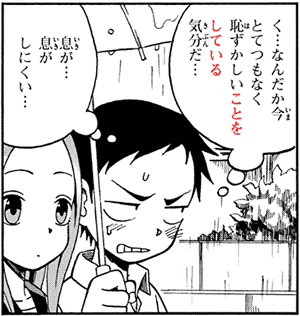
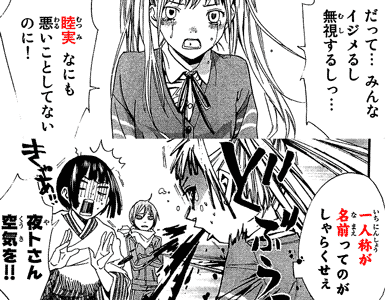

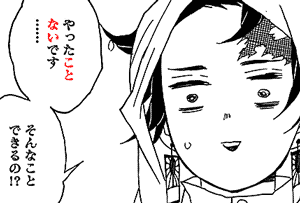
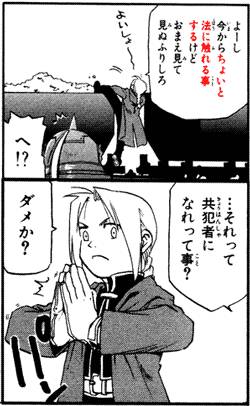
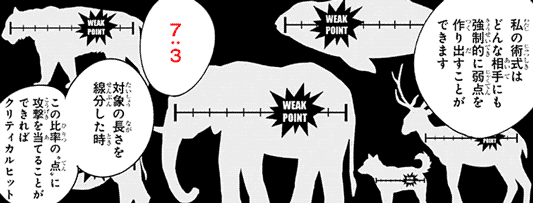
No comments: